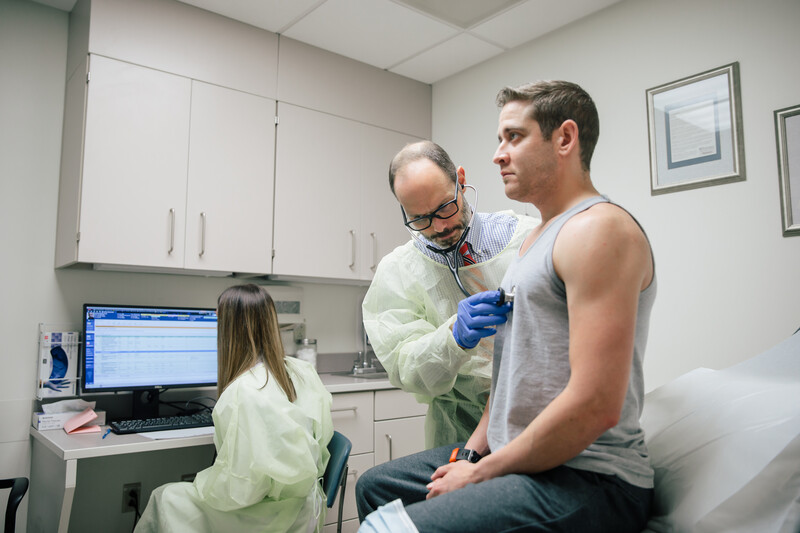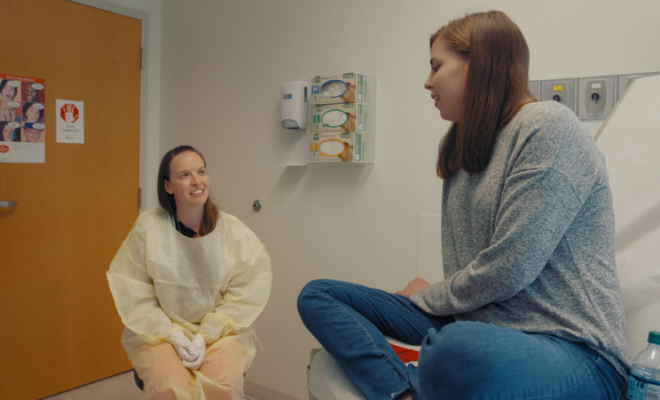Lung Transplant Referral for Individuals With Cystic Fibrosis: Executive Summary
Ramos KJ, Smith PJ, McKone EF, Pilewski JM, et al. Lung transplant referral for individuals with cystic fibrosis: Cystic Fibrosis Foundation consensus guidelines. J Cyst Fibros. 2019 May;18(3):321-333. doi: 10.1016/j.jcf.2019.03.002. Epub 2019 Mar 27.
Purpose and Background
Despite improvements in life expectancy, pulmonary disease remains the major cause of morbidity and mortality for individuals with cystic fibrosis. Lung transplantation (lung transplant) therefore will continue to remain an important therapeutic option for individuals with advanced CF lung disease. However, a significant number of individuals with CF die each year without lung transplant referral.
Early referral for lung transplant increases the likelihood that an individual with CF will be deemed an appropriate candidate for lung transplant and ultimately undergo successful transplant. Early referral also allows modifiable barriers to transplant to be addressed proactively, thereby optimizing candidacy.
Conversely, late referral may result in missing the ideal “window” for transplantation, increasing the risks of waiting list mortality and severe post-transplant complications. The purpose of these guidelines is to provide recommendations to the CF community regarding appropriate identification and timely referral of individuals with advanced CF lung disease to transplant centers.
Methodology
The Cystic Fibrosis Foundation assembled a multi-disciplinary committee that utilized PICO (population, intervention, control, outcome) methodology to guide systematic searches of the medical literature. Additional information was gathered from a focus group of transplant recipients with CF and spouses of recipients. Draft recommendations were developed, voted on by the committee, and accepted if 80 percent of the committee agreed. Public comments were then solicited, leading to another round of revisions and voting by the committee. Twenty-one recommendations were ultimately included in the final guidelines, each with 100 percent agreement among committee members.
Recommendations
| Recommendations | Evaluation of the Evidence |
| 1. The CF Foundation recommends routine clinician-led efforts to discuss disease trajectory and treatment options, including a discussion of lung transplantation. | 100% Consensus |
| 2. The CF Foundation recommends CF care team-initiated discussion regarding lung transplantation with all individuals with CF and a forced expiratory volume in one second (FEV1) < 50% predicted. | 100% Consensus |
| 3. The CF Foundation recommends the use of up-to-date CF-specific transplant resources to promote understanding of the transplant journey and to minimize misconceptions regarding outcomes. | 100% Consensus |
| 4. The CF Foundation recommends that CF clinicians develop relationships with peers at partnering transplant centers. | 100% Consensus |
| 5. The CF Foundation recommends that the individual's CF care team elicit and address CF-specific psychosocial and physical concerns about lung transplantation to facilitate transition to transplant. | 100% Consensus |
| 6. The CF Foundation recommends that modifiable barriers to lung transplantation be addressed preemptively to optimize transplant candidacy; however, unresolved barriers should not preclude referral. | 100% Consensus |
| 7. The CF Foundation recommends the CF and lung transplant care teams acknowledge and provide support for mental health concerns regarding the referral and evaluation process for transplant that are unique to individuals with CF. | 100% Consensus |
| 8. The CF Foundation recommends lung transplant evaluation, regardless of FEV1, when there are markers of shortened survival including: 6-minute walk test (6MWT) distance < 400 meters, hypoxemia (at rest or exertion), hypercarbia, or pulmonary hypertension. | 100% Consensus |
9. For individuals with CF who are 18 years of age and older, the CF Foundation recommends lung transplant referral no later than when:
|
100% Consensus |
10. For individuals with CF who are under the age of 18 years, the CF Foundation recommends lung transplant referral no later than when:
|
100% Consensus |
| 11. For individuals with CF and an FEV1 <40% predicted, the CF Foundation recommends an annual 6MWT, assessment of need for supplemental oxygen, and venous blood gas to screen for markers of severe disease that may warrant transplant referral. | 100% Consensus |
| 12. For individuals with CF who are 18 years and older with FEV1 < 40% predicted, the CF Foundation recommends a baseline echocardiogram to screen for pulmonary hypertension. | 100% Consensus |
| 13. The CF Foundation recommends lung transplant referral for adults with CF with a body mass index (BMI) < 18 and FEV1 < 40% predicted while concurrently working to improve nutritional status. | 100% Consensus |
| 14. The CF Foundation recommends lung transplant referral for individuals with FEV1 < 40% predicted and > 2 exacerbations per year requiring intravenous (IV) antibiotics, or 1 exacerbation requiring positive pressure ventilation, regardless of FEV1. | 100% Consensus |
| 15. The CF Foundation recommends lung transplant referral for individuals with FEV1 < 40% predicted and massive hemoptysis (>240 mL) requiring intensive care unit (ICU) admission or bronchial artery embolization. | 100% Consensus |
| 16. The CF Foundation recommends lung transplant referral for individuals with FEV1 < 40% predicted and pneumothorax. | 100% Consensus |
| 17. For females with CF, especially those who are younger, the CF Foundation recommends special consideration for lung transplant referral even when other thresholds have not been met. | 100% Consensus |
| 18. For individuals with short stature (height <162 cm), the CF Foundation recommends special consideration for lung transplant referral even when other thresholds have not been met. | 100% Consensus |
| 19. The CF Foundation recommends CF clinician consultation with local and geographically distant lung transplant centers for individuals with microorganisms that may pose a risk for lung transplantation. | 100% Consensus |
| 20. Before determining that an individual is not a transplant candidate, the CF Foundation recommends consultation with at least two transplant centers, one of which should have experience addressing the individual's potential contraindications to transplantation. | 100% Consensus |
| 21. For transplant candidates, the CF Foundation recommends communication between the CF and lung transplant care teams at least every 6 months and with major clinical changes. | 100% Consensus |
Unanswered Questions
- How do cystic fibrosis transmembrane conductance regulator modulators influence the course of advanced CF lung disease and will these medications eventually change the current consensus recommendations on the timing of referral for lung transplant?
- Is there a role for more personalized risk “calculators” in determining the optimal time for referral or listing for lung transplant?
- Once a patient has been referred to a transplant center, what factors should determine the timing of listing for transplant and how does this vary across transplant centers?
- Are there additional CF-specific factors that should be included in the lung allocation score calculation?
Further Reading
Relevant manuscripts published after the original guidelines are listed below. These manuscripts have not been reviewed or endorsed by the guidelines committee.
- Lehr CJ, Skeans M, Dasenbrook EC, Fink A, et al. Effect of Including Important Clinical Variables on Accuracy of the Lung Allocation Score for Cystic Fibrosis and Chronic Obstructive Pulmonary Disease. Am J Respir Crit Care Med. 2019 Oct 15;200(8):1013-1021. doi: 10.1164/rccm.201902-0252OC.
Identifies predictors of mortality that are not included in the lung allocation score for individuals with CF listed for lung transplant. A 30 percent relative decline in FEV1 during the year prior to listing is associated with increased risk of death on the waiting list. - Stanojevic S, Sykes J, Stephenson AL, Aaron SD, Whitmore GA. Development and External Validation of 1- and 2- year Mortality Prediction Models in Cystic Fibrosis. Eur Respir J. 2019 Sep 5;54(3). pii: 1900224. doi: 10.1183/13993003.00224-2019. Print 2019 Sep.
Describes a validated predictive risk model for mortality in the CF population. - O’Shea KM, O’Carroll OM, Carroll C, et al. Efficacy of elexacaftor/tezacaftor/ivacaftor in patients with cystic fibrosis and advanced lung disease. Eur Respir J. 2021 Feb 25;57(2):2003079. doi: 10.1183/13993003.03079-2020.
- Asif H, Rahaghi FF, Ohsumi A, et al. Recommendations for Management of Nontuberculous Mycobacterial (NTM) in Lung Transplant Recipients: An International Delphi Study. Am J Respir Crit Care. Med 2021;203:A3945
- McKone E, Ramos KJ, Chaparro C, et al. Position paper: Models of post-transplant care for individuals with cystic fibrosis. J Cyst Fibros. 2023 Mar 5;S1569-1993(23)00059-0. doi: 10.1016/j.jcf.2023.02.011. Online ahead of print.
Use of These Guidelines
The CF Foundation intends for this executive summary of its guideline to summarize the published guideline. The published guideline summarizes evidence, and provides reasonable clinical recommendations based on that evidence, to clinicians, patients, and other stakeholders. Care decisions regarding individual patients should be made using a combination of these recommendations, the associated benefit-risk assessment of treatment options from the clinical team, the patient's individual and unique circumstances, as well as the goals and preferences of the patients and families that the team serves, as a part of shared decision-making between the patient and clinician.
This executive summary was prepared by:
Kathleen J. Ramos, MD, (University of Washington Medical Center), David M. Sayah, MD, PhD (David Geffen School of Medicine at UCLA)
The guidelines were published in May 2019, they were reviewed in July 2021 and it was determined that no update is needed at this time.


